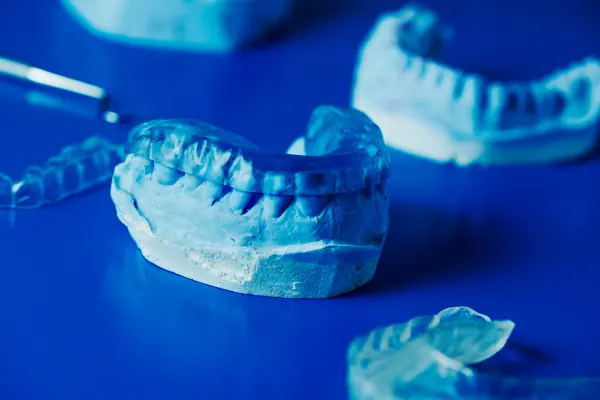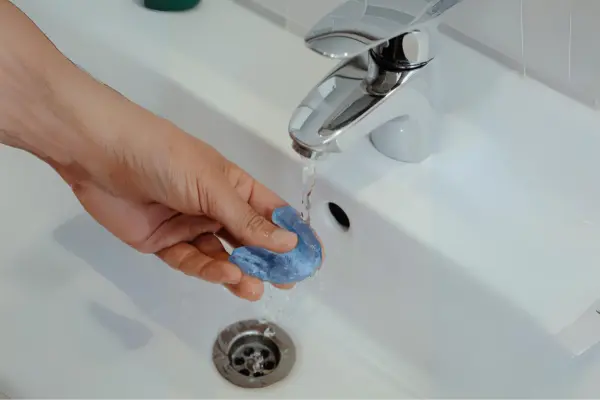Do you ever wake up with a sore jaw or a headache? It might be because you’re grinding your teeth at night, a condition known as bruxism. Wearing a night guard is an excellent way to relieve your Bruxism symptoms. There’s a chance that you won’t have as many headaches, jaw pain, clenching and grinding of teeth. Having a sleep-related movement disorder is frustrating, and we all deserve to have a good night’s sleep. In this blog, we’ll explore the differences between custom and store-bought night guards, helping you decide which one might be best for your needs.
Understanding Night Guards
What Are Night Guards?
Wearing a night guard for bruxism in your mouth helps keep your teeth from grinding against one another as you sleep. In addition to wearing down your enamel, teeth grinding can cause migraines, jaw pain, and in extreme situations, even fractured teeth. By creating a barrier between your upper and lower teeth, a night guard can lessen the risks and reduce the impact of grinding.
Why Use a Night Guard?
A lot of people grind their teeth without even realizing it until a dentist examines the damage or they begin to experience symptoms like jaw pain or strange tooth sensitivity or bruxism. Here are some explanations for why it is so important to use a night guard:
- Prevents Tooth Damage: Grinding your teeth constantly may damage their enamel, making them more sensitive and raising your chance of cavities and tooth decay.
- Reduces Headaches and Jaw Pain: Night guards can relieve jaw strain by reducing the force of grinding. Jaw pain and morning headaches may occur less frequently as a result of this tension release.
- Improves Sleep Patterns: By reducing the pain associated with teeth grinding, a night guard can help you get a better night’s sleep.

Different Types of Night Guards
Night guards for teeth grinding come in various forms, each designed to meet different needs and preferences. Below, we’ll explain the two main types: store-bought night guards and custom-fitted night guards.
Store-Bought Night Guards
Store-bought night guards are the most accessible and cost-effective option for those looking to protect their teeth from grinding without a hefty price tag. These guards are readily available at pharmacies, online retailers, and sporting goods stores. Here are a few key points about store-bought night guards:
- Availability and Convenience: One of the biggest advantages of store-bought night guards is their availability. You can easily purchase them without needing a prescription or a dentist’s appointment.
- Sizes: These night guards typically come in basic sizes: small, medium, and large. This limited sizing aims to accommodate a broad range of mouth shapes and sizes but can also be a drawback as the fit will not be perfect.
- Materials and Design: They are generally made from a thermoplastic material that you can somewhat mold to your teeth using hot water, known as a “boil and bite” guard. This method allows for a better fit than a one-size-fits-all model but is still not precise.
Custom-Fitted Night Guards
Custom-fitted night guards are the better option. They are specifically made to fit the unique contours of your teeth and gums, providing the highest level of protection and comfort. Here’s what makes custom-fitted night guards stand out:
- Custom Fit: To create a custom-fitted night guard, a dentist takes an impression of your teeth. This impression is then sent to a dental lab where your night guard is made using precise measurements.
- Material Quality: Custom night guards are usually made from higher quality materials like non toxic BPA free plastic than their store-bought counterparts. These materials are selected for durability, comfort, and their ability to provide optimal teeth protection.
- Comfort and Effectiveness: Because they are tailored to the exact shape of your mouth, custom night guards offer superior comfort, making them easier to wear throughout the night. The precise fit also means they are more effective at preventing the teeth from grinding against each other, reducing the risk of wear and tear.
- Process and Cost: Getting a custom-fitted night guard involves at least one visit to the dentist for the impression and possibly a follow-up to adjust the fit. This makes them more expensive than store-bought options, but many find the investment worthwhile due to the increased comfort and protection.

How To Get Used To Wearing A Night Guard?
At first, wearing a new device in your mouth may seem strange and uncomfortable, but you will sleep better if you know how to use a night guard and place it properly in your mouth. By finding the correct fit, you can become accustomed to sleeping with a night guard.
Wear the night guard for an hour or two before bed the first time to get acclimated to the feeling. Until you’re comfortable with the sensation of having a device in your mouth, try wearing just the bottom or upper portion of the night guard for one or two nights. You might require a fit modification if the night guard causes you any pain or soreness. When placing the night guard in your mouth, ensure it fits snuggly and securely holds your teeth. It can be uncomfortable if it isn’t placed in the proper position or at an angle.
Also, you need to show your night guard some patience. The first few nights or perhaps a few weeks, you won’t feel at ease wearing it, but soon it will become second nature. For this reason, wear it consistently; otherwise, you won’t adjust to it as quickly.
Maintenance and Care of Night Guards

If you’re wondering how often should I replace my night guard? Then the answer depends on how you care for your device. No matter which type of night guard you choose, taking good care of it will help it last longer and keep it working effectively. Here are some tips on how to clean a night guard:
Cleaning Your Night Guard
- After Each Use: It’s important to clean your night guard every time you use it. Just give it a quick rinse under cold or lukewarm water to remove any saliva or plaque. Avoid hot water as it could warp the material.
- Deep Cleaning: Once a week, you should give your night guard a deeper clean. You can use a toothbrush with soft bristles and a bit of toothpaste to gently scrub it. Alternatively, soaking it in an over-the-counter denture cleaner can also do the trick—just make sure to follow the instructions on the cleaner to avoid any damage
Storing Your Night Guard
- Keep It Dry: After cleaning, make sure your night guard is completely dry before you store it. This helps prevent bacteria from growing on it.
- Proper Storage: Use a hard, ventilated container to store your night guard. The container protects it from dirt and damage while the ventilation prevents moisture buildup, which could lead to mold or bacteria.
Why It’s Important To Care For Your Nightguard
Taking care of your night guard is a bit like brushing your teeth, it’s a small daily habit that can prevent bigger headaches down the road. A clean, well-maintained night guard will protect your teeth effectively, especially if you grind your teeth a lot. Plus, regular maintenance ensures that you’re not putting something full of bacteria back into your mouth night after night.
So, remember, a little effort in cleaning and storing your night guard goes a long way in keeping your smile safe and healthy. Whether you’ve opted for an off-the-shelf model or a custom-fit piece, caring for your night guard ensures it will care for you in return.
How Much Do Night Guards Cost?
When deciding between store-bought vs custom-fitted night guards, cost is often a significant factor to consider. Let’s break down the cost of night guards:
Cost of Store-Bought Night Guards
- Price Range: These can range from as low as $15 to about $50, making them a budget-friendly option for many people. They are readily available at pharmacies, sports stores, and online.
- Considerations: While less expensive, remember that store-bought night guards might not fit perfectly and could need replacing more frequently if they wear out or become uncomfortable. Over time, the cost of replacing them can add up.
Cost of Custom-Fitted Night Guards
- Price Range: Custom night guards are more of an investment, typically costing between $100 to $500, depending on your dentist and the materials used. You can order custom night guards from ALIGNERCO from the convenience of your home and protect your teeth from grinding for $125 only.
- Considerations: The initial cost is higher, but these guards offer a precise fit and superior protection, which can prevent more expensive dental issues caused by ineffective grinding prevention. They also tend to last longer than their store-bought counterparts if maintained properly, potentially making them more cost-effective in the long run.
Final Thoughts
Choosing the right night guard is a personal decision that should be made based on your specific needs, lifestyle, and budget. If you frequently suffer from teeth grinding, investing in a custom-fitted night guard could save you from future discomfort and dental expenses. It offers the best fit, comfort, and protection, attributes that can improve your quality of sleep and overall oral health.
However, if you are trying a night guard for the first time or only need occasional protection, a store-bought night guard might suffice. It allows you to test the waters without a hefty financial commitment. Whatever option you choose, remember that protecting your teeth at night is an important step toward maintaining your dental health.
FAQs
1. How long does a night guard last?
The lifespan of a night guard depends largely on the type and how well you take care of it. Custom-fitted night guards, made from high-quality materials, can last for several years if maintained properly. Store-bought night guards typically need to be replaced more frequently, every 6 to 12 months due to wear and tear from regular use.
2. Can I wear a night guard if I have braces?
Yes, you can wear a night guard with braces. However, it’s important to choose a night guard that accommodates braces, which will usually be a custom-fitted one. This ensures it fits well and offers effective protection without interfering with orthodontic adjustments.
3. Are night guards comfortable to wear?
Comfort depends on the fit and quality of the night guard. Custom-fitted night guards are generally more comfortable because they are made specifically for your mouth using precise measurements taken by your dentist. They fit snugly and don’t shift during sleep.
4. Do night guards stop snoring?
While night guards are primarily designed to protect your teeth from grinding, certain types designed to adjust jaw positioning can help reduce snoring. These are known as mandibular advancement devices and work by slightly pushing the lower jaw and tongue forward, which can help keep the airways open during sleep.
